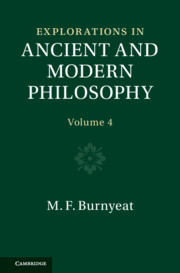Book contents
- Explorations in Ancient and Modern Philosophy
- Explorations in Ancient and Modern Philosophy
- Copyright page
- Contents
- Illustrations
- Preface
- Acknowledgements
- Abbreviations
- Introduction
- Part I Ontology and epistemology
- Chapter 1a Apology 30b2–4: Socrates, money, and the grammar of γίγνεσθαι
- Chapter 1b On the source of Burnet’s construal of Apology 30b2–4: a correction
- Chapter 2 Plato on how not to speak of what is not: Euthydemus 283a–288a
- Chapter 3 Platonism in the Bible: Numenius of Apamea on Exodus and eternity
- Chapter 4 Kinēsis vs. energeia: a much-read passage in (but not of) Aristotle’s Metaphysics
- Chapter 5 De Anima ii.5
- Chapter 6 Aquinas on ‘spiritual change’ in perception
- Chapter 7 Epistēmē
- Part II Physics and optics
- Bibliography
- Index locorum
Chapter 1a - Apology 30b2–4: Socrates, money, and the grammar of γίγνεσθαι
from Part I - Ontology and epistemology
Published online by Cambridge University Press: 24 March 2022
- Explorations in Ancient and Modern Philosophy
- Explorations in Ancient and Modern Philosophy
- Copyright page
- Contents
- Illustrations
- Preface
- Acknowledgements
- Abbreviations
- Introduction
- Part I Ontology and epistemology
- Chapter 1a Apology 30b2–4: Socrates, money, and the grammar of γίγνεσθαι
- Chapter 1b On the source of Burnet’s construal of Apology 30b2–4: a correction
- Chapter 2 Plato on how not to speak of what is not: Euthydemus 283a–288a
- Chapter 3 Platonism in the Bible: Numenius of Apamea on Exodus and eternity
- Chapter 4 Kinēsis vs. energeia: a much-read passage in (but not of) Aristotle’s Metaphysics
- Chapter 5 De Anima ii.5
- Chapter 6 Aquinas on ‘spiritual change’ in perception
- Chapter 7 Epistēmē
- Part II Physics and optics
- Bibliography
- Index locorum
Summary
The framework of this paper is a defence of Burnet’s construal of Apology 30b2–4. Socrates does not claim, as he is standardly translated, that virtue makes you rich, but that virtue makes money and everything else good for you. This view of the relation between virtue and wealth is paralleled in dialogues of every period, and a sophisticated development of it appears in Aristotle. My philological defence of the philosophically preferable translation extends recent scholarly work on εἶναι in Plato and Aristotle to γίγνεσθαι, which is the main verb in the disputed sentence. When attached to a subject, both verbs make a complete statement on their own, but a statement that is further completable by adding a complement. The important point is that the addition of a complement does not change the meaning of the verb from existence to the copula. Proving this is a lengthy task which takes me into some of the deeper reaches of Platonic and Aristotelian ontology, and into discussion of whether Greek ever acquired a verb that corresponds to modem verbs of existence. I conclude that even when later authors such as Philo Judaeus, Sextus Empiricus and Plotinus debate what we naturally translate as issues of existence, none of the verbs they use (εἶναι, ὑπάρχειν, ὑφεστηκέναι) can be said to have existential meaning.
- Type
- Chapter
- Information
- Explorations in Ancient and Modern Philosophy , pp. 5 - 40Publisher: Cambridge University PressPrint publication year: 2022

